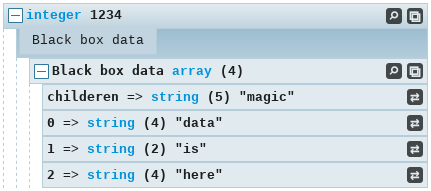Writing plugins
Parser plugin interfaces
Parser plugins have to implement either PluginCompleteInterface or PluginBeginInterface depending on which triggers they want to respond to. Both of these extend PluginInterface.
All plugins need to implement setParser, getTypes and getTriggers.
setParserreceives the parser before the dump begins. You can store it for later use or discard it.getTypesreturns the types of data this plugin can operate on. These are types as returned bygettype.getTriggersreturns a bitmask of the events that will trigger this plugin. These are all constants of theParserclass.TRIGGER_BEGINruns before any parsing is doneTRIGGER_SUCCESSruns after parsing successfully finishesTRIGGER_DEPTH_LIMITandTRIGGER_RECURSIONrun after parsing is haltedTRIGGER_COMPLETEisTRIGGER_SUCCESS | TRIGGER_RECURSION | TRIGGER_DEPTH_LIMIT
If you use TRIGGER_BEGIN your plugin needs to implement PluginBeginInterface, otherwise it should implement PluginCompleteInterface.
Begin plugins
When implementing a PluginBeginInterface you need to implement parseBegin. This takes the input variable and a ContextInterface and either returns an AbstractValue or null.
If a value is returned the parse will halt immediately, if null is returned the parse will continue with other begin plugins followed by the normal parse.
Complete plugins
When implementing a PluginCompleteInterface you need to implement parseComplete. This takes the input variable, the initially parsed AbstractValue, and the trigger in question.
parseComplete must always return an AbstractValue, which will replace the input value in further plugin calls and when the parser returns.
An example plugin
Let’s imagine we’re working on a system that’s a big black box. Everything has an ID, and we can get all the data we need by calling a function for that ID.
Wouldn’t it be great if we could automatically show the data associated with an ID whenever we come across one?
A barebones plugin
<?php
use Kint\Parser\Parser;
use Kint\Parser\PluginCompleteInterface;
use Kint\Value\AbstractValue;
use Kint\Value\Context\BaseContext;
use Kint\Value\Representation\ValueRepresentation;
class MyPlugin implements PluginCompleteInterface
{
public function setParser(Parser $p): void
{
}
public function getTypes(): array
{
return ['integer', 'string'];
}
public function getTriggers(): int
{
return Parser::TRIGGER_SUCCESS;
}
public function parseComplete(&$var, AbstractValue $v, int $trigger): AbstractValue
{
echo 'My parser found: ';
var_dump($var);
return $v;
}
}
Kint::$plugins[] = new MyPlugin();
d(1234);
Since we’re taking IDs they will probably be either strings or integers, so we return an array with both types. We’re going to use TRIGGER_SUCCESS for our plugin.
We’ll just put a var_dump in parseComplete to make sure everything’s working and return the input value.
Lastly, we add the plugin to the Kint::$plugins array and try it out.
Yay!
Implementing our plugin’s functionality
private Parser $parser;
public function setParser(Parser $p): void
{
$this->parser = $p;
}
public function parseComplete(&$var, AbstractValue $v, int $trigger): AbstractValue
{
if (!ctype_digit((string) $var)) {
return $v;
}
global $big_black_box;
$data = $big_black_box->get_data_from_id($var);
if (empty($data)) {
return $v;
}
$base = new BaseContext('Black box data');
$base->depth = $v->getContext()->getDepth() + 1;
$ap = $v->getContext()->getAccessPath();
if (null !== $ap) {
$base->access_path = '$GLOBALS[\'big_black_box\']->get_data_from_id('.$ap.')';
}
$parsed_data = $this->parser->parse($data, $base);
$r = new ValueRepresentation('Black box data', $parsed_data);
$v->addRepresentation($r);
return $v;
}
Firstly, we’re going to be using the parser, so we store it with setParser().
When we get a variable to parse, we first check that what we have is actually an ID. If it’s a random string we don’t need to waste time trying to get data from it, so we’ll just return the input value.
Get the data we want to add to the dump. If we couldn’t find any we’ll just return.
Make our BaseContext – this needs to contain information from the parent scope like the variable’s name, access path, depth, whether it’s public or private, etc.
If we have an access path to the variable we’re parsing now, we can continue the access path to the data by wrapping the current one in the code we need to get the data. This means if the ID is found at $array['key']->prop then $data['children'] will have an accurate access path like:
$GLOBALS['big_black_box']->get_data_from_id($array['key']->prop)['children']
Parse the data with the base context into a new AbstractValue, then create a ValueRepresentation to display it. We could also use a StringRepresentation to display text or a ContainerRepresentation to display a list of multiple values.
Lastly, we add the representation to the value and return it.
Yay!
You can look at the source code for the plugins shipped with Kint by default for more detailed examples on various behaviors.
Renderer plugins
Since renderers aren’t unified they also have different plugin systems. Rich plugins must implement either Kint\Renderer\Rich\ValuePluginInterface or Kint\Renderer\Rich\TabPluginInterface and text plugins must implement Kint\Renderer\Text\PluginInterface.
TabPluginInterface will be called based on the output of RepresentationInterface::getHint(), while ValuePluginInterface and PluginInterface will be called based on the output of AbstractValue::getHint().
If you require more sweeping changes you can also write your own renderer from scratch, or subclass the existing ones.
Utilities
These methods can come in handy.
Kint\Parser::getCallerClass() |
Returns the class that called Kint or null. |
Kint\Parser::getDepthLimit() |
Returns the depth limit on the parser. |
Kint\Parser::parse() |
Parses a value. |
Kint\Utils::getHumanReadableBytes() |
Returns an array with a unit and value of a human readable representation of the amount of bytes. |
Kint\Utils::isSequential() |
Returns true if the array is sequential. |
Kint\Utils::isAssoc() |
Returns true if the array has any string keys. |
Kint\Utils::isTrace() |
Returns true if the array appears to be a valid backtrace. |
Kint\Utils::traceFrameIsListed() |
Returns true if the array class and function match a list of callables in the format of Kint::$aliases. |
Kint\Utils::normalizeAliases() |
Normalizes callables in the format of Kint::$aliases. |
Kint\Utils::isValidPhpName() |
Returns true if the string is valid as a php name. |
Kint\Utils::isValidPhpNamespace() |
Returns true if the string is valid as php names separated by backslashes. |
Kint\Utils::errorSanitizeString() |
Truncates a string at a nul byte for use in trigger_error. |
Kint\Utils::getTypeString() |
Returns a string of the ReflectionType across versions of PHP. |
Kint\Utils::truncateString() |
Truncates a string to a specified length, and appends an ellipsis if needed. |
Kint\Utils::detectEncoding() |
Detects a strings encoding based on Utils::$char_encodings and Utils::$legacy_encodings. |
Kint\Utils::strlen() |
mb_strlen with encoding detection. |
Kint\Utils::substr() |
mb_substr with encoding detection. |
 Kint
Kint
